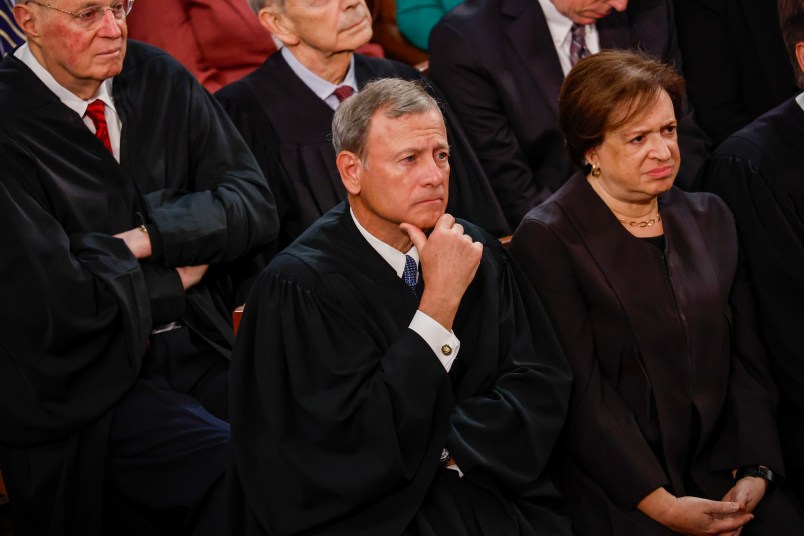Stop me if you’ve heard this one before: Texas, by way of the 5th Circuit Court of Appeals, is before the Supreme Court on a conservative culture-war issue.
This case centers on a Texas law that requires sites with one-third or more content that is “harmful to minors” to verify the age of users before granting access.
The Free Speech Coalition — an adult entertainment industry trade group — challenged the law and won at the district level before losing at the 5th Circuit. The 5th Circuit ruled that the law only needed to be reviewed with the rational basis standard, a break with Supreme Court precedent in which the justices had reviewed a federal law even the 5th conceded was “very similar” to the Texas one under the strict scrutiny standard — a higher standard for issues that involve what the Court regards as fundamental rights.
That line of precedent had established the idea that laws preventing adults from seeing sexual materials must survive strict scrutiny, even if the laws were passed with the intention of keeping minors from seeing that material.
On Wednesday, many of the justices seemed to seriously contemplate allowing the 5th Circuit to unilaterally roll back this line of higher court precedent.
“Technological access to pornography obviously has exploded,” Chief Justice John Roberts said to the Free Speech Coalition’s lawyer. “It was very difficult for 15-year-olds, whatever, to get access to the type of things that are available with the push of a button today.”
“Are those the sort of developments that suggest revisiting the standard of scrutiny as something we should at least consider, as opposed to keeping a structure that was accepted and established in an entirely different era?” he asked.
The concern about advancing technology cut the opposite way too; Justice Ketanji Brown Jackson pointed out the infringement of the privacy of adults inherent in having to prove their age with methods like biometric scans. In briefs submitted to the Court, some brought up the risk that data breaches or hacks could expose identifying information of the adults accessing the sites.
Still, the case didn’t fall neatly along partisan lines. Both liberal and conservative justices fretted about weakening First Amendment protections.
“I share some of Justice Thomas’ discomfort with watering down strict scrutiny,” Justice Amy Coney Barrett said.
“It seems to me there are possible spillover dangers either way,” Justice Elena Kagan added. “One is the spillover danger of: You relax strict scrutiny in one place and all of a sudden, strict scrutiny gets relaxed in other places. The other is the spillover danger of: You treat a clearly content based law as not requiring strict scrutiny and all of a sudden you start seeing more content-based restrictions that don’t have to satisfy strict scrutiny.”
The Biden administration intervened to ask that the law be sent back to the 5th Circuit with instructions that the appellate court appraise it under the strict scrutiny standard. In other words: that the Supreme Court again rhetorically smack its inferior court for deciding that precedent it doesn’t like simply no longer applies.







Starting to think it might have been a good idea to burn down the churches that told the Confederacy that slavery was OK with God. Oh, and the murder of their fellow Americans.
But, they’re the most powerful voting bloc in the whole country, you say?
Oops.
"“Technological access to pornography obviously has exploded,” Chief Justice John Roberts said to the Free Speech Coalition’s lawyer. “It was very difficult for 15-year-olds, whatever, to get access to the type of things that are available with the push of a button today.”
“Are those the sort of developments that suggest revisiting the standard of scrutiny as something we should at least consider, as opposed to keeping a structure that was accepted and established in an entirely different era?” he asked."
Answer: Nope. That the exercise of free speech and access to others’ exercise of it have become easier does not make the speech itself more dangerous or justify the abandonment of strict scrutiny.
This is all just an attempt to get the Crusader’s warhorse’s nose in the tent. They will INSTANTLY pivot to labeling anything LGBTQ as dangerous to minors and require that even things like political advocacy websites…such as those providing information about where to seek help for things like suicidal thoughts or parental abuse related to the child’s identity…have an age checking filter system.
They will enforce an age checking filter system on TPM, too. One that prohibits any commenters over the age of six years.
GOP: “We must pass laws to protect children from images!”
Also GOP: “There’s nothing we can do to protect children from guns!”